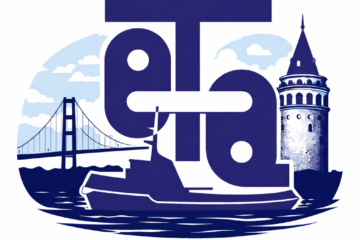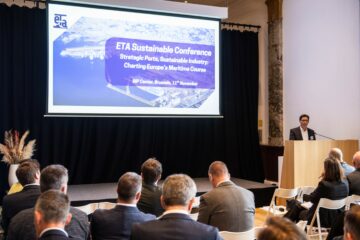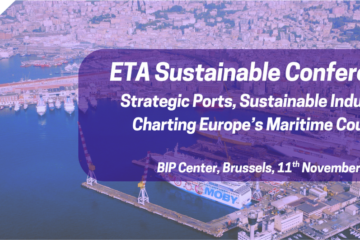On Thursday and Friday 2nd and 3rd of June the 13th edition of the Annual Conference of the European Sea Ports Organisation (ESPO) was held in Dublin. More than 280 delegates, prominent speakers and interesting debates marked a successful meeting.
The ETA was invited to attend the conference; Anna Maria Darmanin, Secretary-General and Hugo Callens, Honorary Member attended on behalf of the ETA. It was a great opportunity to interact with various port stakeholders across Europe.
Santiago Garcia-Mila, Chairman, ESPO argued: “We believe that it is time to go beyond the “yes/no” discussion on a “European Maritime Single Window, whatever it might mean. We believe developing an ambitious but realistic roadmap, taking into account the realities of shipping and the existing EU and national legal requirements will give the European port, shipping industry a real window of opportunities!”
Eamonn O’Reilly, Chief Executive, Port of Dublin added: “It was a great opportunity to host both the Cruise Europe and ESPO Conferences in one week and to link them with the celebrations with our local community on the occasion of the Riverfest. This marks again our commitment to societal integration.”
Stavros Hatzakos, Chairman of the ESPO Cruise and Ferry Port Network elaborated on the code of Good Practices: “Even if the code of Good Practices is a comprehensive document, it must be seen as a starting point. The annex with concrete examples that you can consult on the ESPO website will make it a living code allowing all interested ports to learn about new practices and examples and to complete and exchange new experiences with other ports. We also hope that this code will further enhance the cooperation and discussion with the other main cruise and ferry stakeholders in view of improving the performance of the sector as such and giving the sector the image it deserves.”
Knut Fleckenstein, Member of the European Parliament and Rapporteur on the Port Regulation provided an update with regards to the Regulation: “The negotiations are advancing well, but whether or not we will find an agreement with the Dutch presidency mainly depends on two things: the Council’s willingness to show flexibility in terms of the social provisions and the progress made in the field of state aid and the block exemptions” and added that “neither the Port Regulation nor the GBER are means to extend the concessions directive. We have a directive from 2014 with clear rules on concessions. If the commission wishes to revise it, they should do so by a legislative procedure and not by using the GBER as a back door entry.”
Martina Fontanet, Senior Advisor Port and Maritime Policy, Competition, Trade Facilitation and Statistics, ESPO presented a report on trends in EU port governance: “The vast majority of ports consider themselves as mission driven entities where cost recovery or profit is a must. The survey also shows that port authorities are proactive TEN-T networkers and that they work towards increased transparency.”
Kurt Nagle, President and CEO, AAPA-American Association of Port Authorities commented on the pending trade agreements: “American presidential elections will have an impact on pending trade agreements. If concluded, the Trans-Pacific Partnership (TPP) and the Transatlantic Trade and Investments Partnership (TTIP) will have an important influence on traffic of American ports.”
Prof. Dr. Theo Notteboom, Professor and High-End Foreign Expert (SAFEA, State Administration of Foreign Expert Affairs), Transportation Management College, Dalian Maritime University (DMU) stressed: “The Chinese are developing their own global core port network. Be sure to be part of it.”
Lars Jensen, Chief Executive, Cyberkeel focused on cyber-attacks related to ports: “Cyber attackers target the easiest prey. In order to face cybersecurity challenges, ports should have contingency plans, improve staff awareness, update procedures, and develop system separation.”
Henrik Hololei, Director General, DG MOVE European Commission commented on the Commission’s intentions to simplify authorisation procedures: “Good infrastructure planning should also be to simplify our cumbersome authorisation procedures. For large infrastructure projects it takes often more than 10 years from planning to building or dredging! This is why as announced in the Communication adopted on 1 June on its investment plan, we would like to explore the possibility to set up a single EU authorisation framework to replace the many authorisation procedures for large projects with cross-border impacts.”
Pat Cox, Former President of the European Parliament and EU Coordinator for the Scandinavian-Mediterranean Corridor stressed: “The big added value of the TEN-T Corridors is the chance for people to talk with each other and not at the each other. If you wait for an EU grant as a primary driver, you might be waiting. Don’t postpone critical infrastructure developments, please sit down and look at other financial instruments.”
The conference was hosted by Dublin Port and the invitees where treated to being in some of the historic treasures of Dublin. Furthermore, the conference ended with a very interesting visit in the port of Dublin.
The next ESPO Conference will be hosted by the Port of Barcelona, Spain on the 1st and 2nd of June 2017.



0 Comments